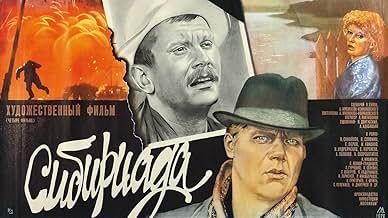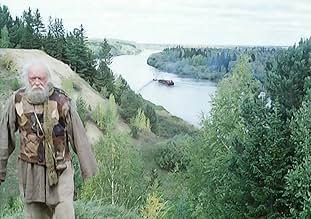IMDb RATING
7.9/10
2.4K
YOUR RATING
In the Siberian wilderness in the village of Yelan, two families live, who have long been at war with each other: the «kulaks» of Solomina and the «poor people» of Ustyuzhanina.In the Siberian wilderness in the village of Yelan, two families live, who have long been at war with each other: the «kulaks» of Solomina and the «poor people» of Ustyuzhanina.In the Siberian wilderness in the village of Yelan, two families live, who have long been at war with each other: the «kulaks» of Solomina and the «poor people» of Ustyuzhanina.
- Director
- Writers
- Stars
- Awards
- 2 wins & 2 nominations total
- Director
- Writers
- All cast & crew
- Production, box office & more at IMDbPro
Featured reviews
Siberiade is a magnificent epic. The story takes place mostly in the Siberian village Yelan, near which large deposits of oil lie. Two generations of villagers get caught up in turbulent times, when there was expansion in the Orthodox Civilization. The 1979 film is all about the characters. Well-known Soviet actors were cast in the leading roles, including Oscar winner Nikita Mikhalkov, Natalya Andrejchenko and Vitaly Solomin. Their losses are truly emotional yet they also go through periods of exaltation. The revolution brought hope but difficult struggles followed too. The cinematography by Levan Paatashvili captures the beauty of Siberia's wilderness in a simple but well done manner. Black & white footage of heroic periods in Russia's 20th century history bridge the eras in the characters' lives. Director Andrei Konchalovsky wasn't afraid to show a few uneasy scenes, and there's even a bit of female nudity. Yet his direction is effective and he succeeded in telling an absorbing epic of an interesting time in Russia's history. The film is known for Eduard Artemyev's memorable electronic score. The score was even released internationally, and I heard a piece of it in CNN's Cold War (1998) documentary. Siberiade won the Special Grand Jury Prize at the 1979 Cannes Film Festival, and I highly recommend seeing it.
I have seen the film a few days back on a video tape and even though it was hard to swallow it at one take (because of its length and story), I liked it very much. I was impressed first, by the script and then, by the realization of this script. The film takes you on a ride, but that is not an easy, joyful ride; it goes through time and different political regimes and shows the influence of them to ordinary people's lives. What I loved was the inner logic the film followed; logic, which just like logic in life, was rather illogical and confusing at times but in the end, when I thought about it, all the events and twists made sense. It makes no sense though to try to re-tell the story as it spreads in more than 50 years of time. I also liked very much Nikita Mikhalkov's character Aleksei and the way he played it, as some critics would saw, with restless abandon. What I didn't like about it, was that I think he later played characters that remind me of Aleksei in films like "Cruel Romance" (Zhestokij romans, which I actually love) and to some extent in "The Insulted and the Injured" ("Unizhennye i oskorblyonnye"). "Sibiriada" shows, I think, what a great film-maker Andrei Konchalovski was before he went to Hollywood and made forgettable films like "Tango and Cash" and less forgettable like "Runaway train". I would prefer "Kurochka Ryaba" to them...
Inexplicably this is compared to "Doctor Zhivago," I suppose because there are Russian revolutionaries. Egad. The films couldn't be more different.
This is inspired by "2001." Equally inexplicably, "Solaris" is called the Russian 2001 because. Heck, because it has space hardware. Jees.
The structure of "2001" is its reason to be, a fight among three narrative perspectives. We never know who wins: the human, machine or divine. Each is presented in a way that could be interpreted to subsume the others, and we are never grounded. Its sublime, each level above the other in a sort of Escher narrative.
This is the same, very deliberately so. We have the same three: we have the human story of sex, love community and how that embraces everything, Miss Marplewise. We have the "machine" or the revolution and its apparatus, some figurative and some literal. And we have the mystical energy and laws of nature, which are deliberate, clear, pervasive here.
(If there is something particularly skillful in this project cinematically, it is how this mystical mist pervades.)
Its not at all as deft in the balance as Kubric's masterpiece. But you can see the three climbing over each other, and the standoff presented at the end.
Its a long slog, and you'll have to wade through overly optimistic celebrations of revolutionary purpose. But its rewarding in a sort of Polish (meaning dreamy) way.
On a second viewing, I have to remark on how the fundamental nature of this is different from most else that I watch.
I'm particularly sensitive to the fact that most every element that I see in every film project is a matter of market forces. An artist can modulate within that pull, but never really escape the sender-receiver dynamic. This film differs in the way that some monumental architecture does from what surrounds it.
In the soviet system, you pay your dues and prove that you are a worthy artist. That means of course that you have to satisfy the artistic bureaucracy, the nature of which one can only imagine. But once you achieve some level of power, you become a dilettante, with amazing reach. Everything we see here is because it was envisioned to be so, quite apart from what we normally have to deal with in the "free" world.
Its the inversion that is striking. This film really is perfect in many ways. You can see that every frame and nuance is the way the filmmaker wants it regardless of whether he thinks people care. I didn't care much, because the thing is as soulless as most other Soviet art. But its very clean, and big and sentimental.
And its different, and that's a welcome shower.
Ted's Evaluation -- 3 of 3: Worth watching.
This is inspired by "2001." Equally inexplicably, "Solaris" is called the Russian 2001 because. Heck, because it has space hardware. Jees.
The structure of "2001" is its reason to be, a fight among three narrative perspectives. We never know who wins: the human, machine or divine. Each is presented in a way that could be interpreted to subsume the others, and we are never grounded. Its sublime, each level above the other in a sort of Escher narrative.
This is the same, very deliberately so. We have the same three: we have the human story of sex, love community and how that embraces everything, Miss Marplewise. We have the "machine" or the revolution and its apparatus, some figurative and some literal. And we have the mystical energy and laws of nature, which are deliberate, clear, pervasive here.
(If there is something particularly skillful in this project cinematically, it is how this mystical mist pervades.)
Its not at all as deft in the balance as Kubric's masterpiece. But you can see the three climbing over each other, and the standoff presented at the end.
Its a long slog, and you'll have to wade through overly optimistic celebrations of revolutionary purpose. But its rewarding in a sort of Polish (meaning dreamy) way.
On a second viewing, I have to remark on how the fundamental nature of this is different from most else that I watch.
I'm particularly sensitive to the fact that most every element that I see in every film project is a matter of market forces. An artist can modulate within that pull, but never really escape the sender-receiver dynamic. This film differs in the way that some monumental architecture does from what surrounds it.
In the soviet system, you pay your dues and prove that you are a worthy artist. That means of course that you have to satisfy the artistic bureaucracy, the nature of which one can only imagine. But once you achieve some level of power, you become a dilettante, with amazing reach. Everything we see here is because it was envisioned to be so, quite apart from what we normally have to deal with in the "free" world.
Its the inversion that is striking. This film really is perfect in many ways. You can see that every frame and nuance is the way the filmmaker wants it regardless of whether he thinks people care. I didn't care much, because the thing is as soulless as most other Soviet art. But its very clean, and big and sentimental.
And its different, and that's a welcome shower.
Ted's Evaluation -- 3 of 3: Worth watching.
This is just one of these rare cinema experiences. I've seen this film twice in cinema about 15 years ago. The first time in a stonecold auditorium (they ran out of heating oil) we all just sat there with gloves, jackets and other stuff to keep you warm. The film made such an impact with its beautifull images and its rare story. Russian cinema has a couple of these slow and long movies. Siberiade is a long (over 4 and a half hour) and slow movie. Long shots of man wading through cold swamps in search of oil. I like it!!!! It is a shame there was no videorelease in Europe, and now lets wait for the DVD!! Martin
I was young film student in 1979 when the Union of the Soviet Filmmakers came to Sofia Bulgaria and premiered Konchalovsky's "Siberiade"; Tarkosvky's "Stalker" and Danelia'a "Autumn marathon". I was stunned by the cosmopolitan dimension of the art form. Then and only then, I saw "Siberiade" 4 and 1/2 hours epic and was speechless. Way better then Bertolucci's "1900". By far!
Hope Andron will somehow get to the negative and make "director's restored version full lenght " someday! On DVD of course! Also I fiercely fought in defense of this Cinema against most of my colleagues who were equating Soviet film with bad taste! Time is on my side.
Hope Andron will somehow get to the negative and make "director's restored version full lenght " someday! On DVD of course! Also I fiercely fought in defense of this Cinema against most of my colleagues who were equating Soviet film with bad taste! Time is on my side.
Did you know
- TriviaLongest film to be in competition for the Palme d'Or.
- GoofsThe boom mic is visible for less than a second in the top left corner at roughly 1:29:11, when Alexei is talking to the elder grandfather, and the grandfather stands up and begins chanting at him.
- Alternate versionsOriginally released in the United States in a 190 minute version.
- ConnectionsEdited from Le triomphe de la volonté (1935)
- How long is Siberiade?Powered by Alexa
Details
Box office
- Gross worldwide
- $1,753
- Runtime
- 4h 35m(275 min)
- Color
- Aspect ratio
- 1.37 : 1
Contribute to this page
Suggest an edit or add missing content





































